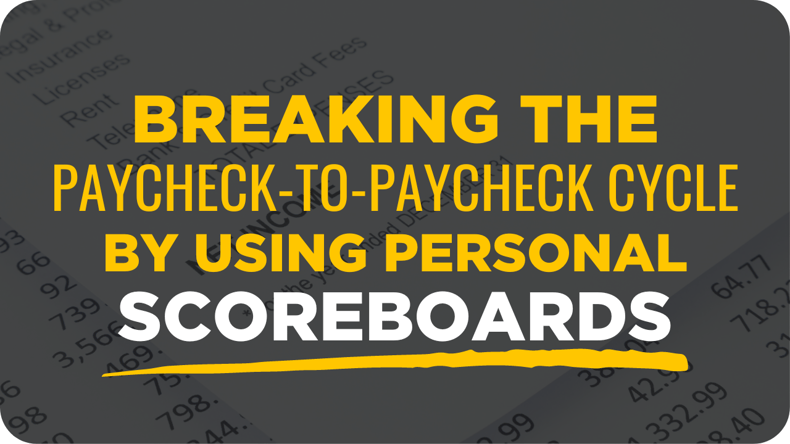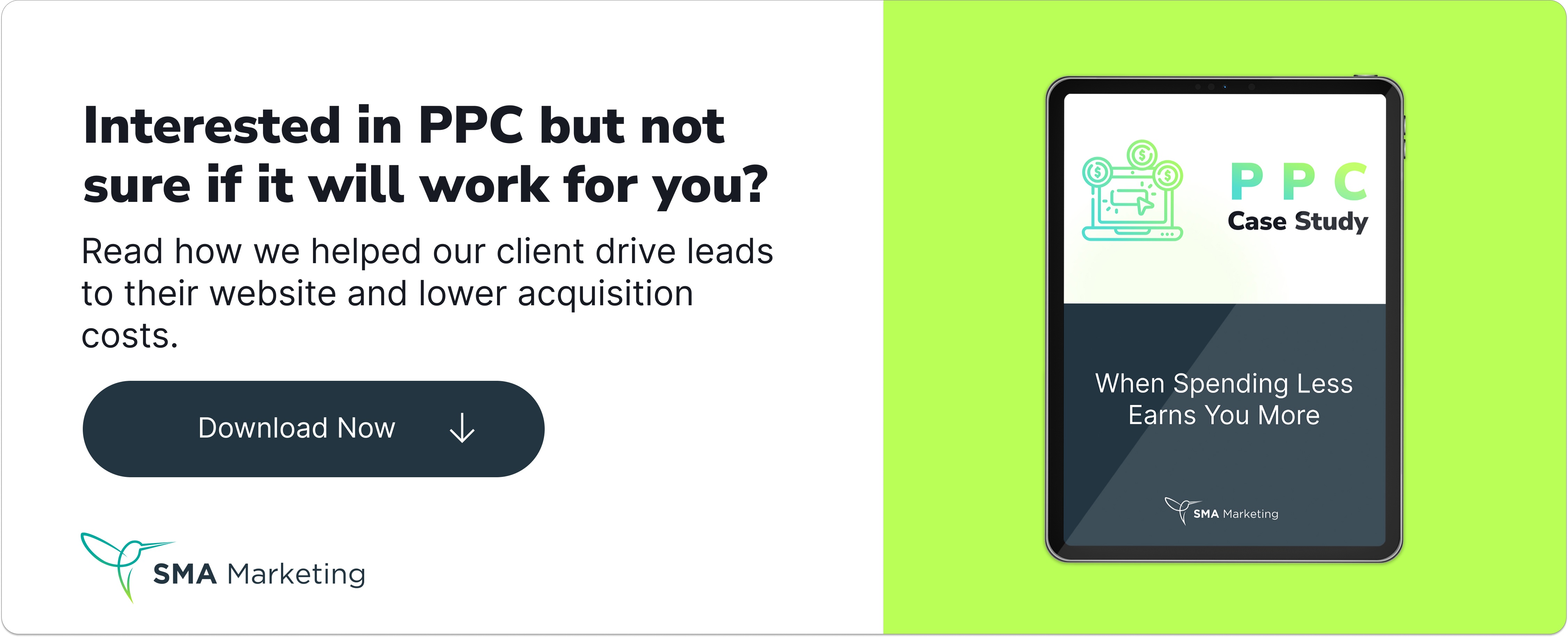Table of Contents

If you’ve spent any amount of time online looking for help with digital marketing strategies, you will inevitably find yourself inundated with terms and acronyms that probably seem like a bunch of gibberish. To start, you have SEO (search engine optimization), PPC (pay-per-click), SEM, H1, CTA, and a whole lot more. It can feel overwhelming but do not despair. The focus of this article is PPC and what it has come to mean to me. However, if at the end of this you are still wondering about some of those other terms, I encourage you to check out our entire blog, where we have discussed all those topics in great detail.
What is PPC Marketing?
PPC stands for Pay-Per-Click, and PPC marketing is an online advertising method where advertisers pay a fee each time someone clicks on their ad. PPC can appear in many different forms, but the easiest way to explain it is that PPC search ads are those you see at the top of a Google results page that says “ad.” Keep in mind that online paid ads can run on a lot of different platforms, but to prevent this blog from becoming a novel, I will keep my examples limited to only Google Ads.
There are many different reasons a company might choose to use this form of marketing and advertising; for me, it’s fast and effective, and the results are often clear as day. For many companies, the concept of knowing the ROI down to the penny is appealing. When you are setting up a PPC campaign, you might create a system where you pay per ad viewed (viewable impressions), per ad clicked (thus pay-per-click), or you’ll pay if a specific action (a conversation) is taken. These actions might include having a potential customer click on an ad and end up on a landing page where they fill out a form on your website.
What are the Benefits of Using PPC Marketing?
The benefits of using PPC marketing are numerous, so let’s just start with the top 3:
Productive – Unlike traditional marketing methods, PPC allows you to test and measure your campaigns quickly and easily. You can even track how much money you spend on every single keyword you target!
- Targeted – One of the biggest advantages of PPC is its ability to target your ideal customers. You can reach a very specific target audience, by using a list of keywords related to your products and services.
- Cost-Effective – Another benefit of PPC is that it costs less than traditional marketing methods. Since you aren’t paying for media space, you can save a ton of money.
Building a Successful PPC Digital Marketing Campaign
A lot goes into building a successful PPC campaign, and it doesn’t happen overnight. The first thing to keep in mind when planning your PPC campaign strategy is the relevant keywords or key terms to attract your potential customers. You should always do research and prepare a list of target keywords before you begin creating your ad copy. I recommend using a keyword selection research tool such as Google Keyword Planner, SEMrush, or Moz. These tools can run you through the keyword match types that will bring you the best results.
You should also include negative keywords as well. Negative keywords prevent your ad from appearing when someone searches for something else. For example, if you want to be known as the best business for a certain industry you would not want to show in results for the worst local business in that industry.
Once you decide on the keywords you want to target, you need to create a landing page for them. The landing page needs to have a call-to-action (CTA). This could be anything from filling out a form, downloading a white paper, or signing up for a newsletter.
Next is your ad copy. Your ad copy should clearly state what you are offering and why people should buy from you. Make sure that your ad text is compelling enough to get people clicking through to your landing page.
Finally, once you have created all of your ads, you need to decide on the bidding strategies for your campaign management. Bids are how much you are willing to pay for each click. You want to bid high enough to ensure that you don’t lose money but low enough to ensure that you get clicks. If you are unsure about bidding, I would recommend starting with $0.50/CPM (cost per thousand impressions) and then gradually increasing your bids until you find a good balance between cost and performance.
It may seem overwhelming at first, but it becomes second nature over time. Once you have completed all of the above steps, you will be able to monitor your campaign performance to see what works and what doesn’t. All of the data you collect will allow you to conduct a data-driven analysis and help you to refine your strategy and improve your overall conversion rate.
Local PPC SEO
One of my favorite ways to use PPC is to drive the amount of traffic a local client sees. Local PPC drives people to your site who are looking for products or services within a specific geographical region. Local SEO is focused on making it easier and faster to find you when someone in your neighborhood types a few keywords into their browser; it helps you reach potential clients who are most likely to be interested in buying your products or services. When creating local PPC campaigns make them specific, tailor them to your community and use words and other references that people from your area will know and connect with. You should also include a location extension so that your company address is displayed. Read How To Get The Most Out of Your Local SEO Strategy for more tips.
Some Thoughts On Paid Display Ads
Ok, we could discuss what PPC is and how to use it all day, but I have other things to say as well. When I started familiarizing myself with PPC, I had some serious doubts. I often start out apprehensive about unfamiliar marketing concepts until I learn more about them. I’ve never put a lot of trust in paid Google ads as part of a digital marketing strategy, but that was coming from an uneducated consumer’s perspective. You might be interested to know that my negative view of PPC ads puts me in the statistical minority of Google Ad users.
After taking some classes and picking up some digital advertising certifications, I started to take over campaigns for our clients. What I found was that by making smart, logical decisions, you could impact a client’s ROI overnight. I was not only impressed with the performance of the ads but I was also impressed by the fact that other consumers were apparently not as apprehensive about paid ads as I had been. In fact, if the ad offered the consumer what they were looking for, they were going to click on it without worry. This trust in paid Google ads means that PPC is an effective form of advertising. Some estimates show that every dollar spent on PPC results in gross revenue of two dollars.
Additionally, as I became a PPC “insider,” I realized that not only do people trust these Google Ads, the ads themselves can be beneficial to others. If done with the right intent, the ads are a service to consumers. What I mean by that is if an ad delivers what it promises and appears above organic search results, then a consumer can immediately find the solution they are looking for.
The First P Stands For Personal Growth… Not Really
Perhaps the most fantastic thing about PPC was the personal growth that occurred when I started to dive in. Running PPC campaigns satisfies my need for order and organization better than any other aspect of marketing has ever done for me.
The entire concept behind PPC is that you are supposed to make small educated changes to the account and then watch the data to weigh the impact of said change. I cannot express enough how much I love this. If you are a slow, calculated worker like me, then you will enjoy running smart campaigns for PPC. The ability to prove with numbers that your careful approach was worth it, in the end, helps me cope with the anxiety that comes with taking a long time to complete my work. I take comfort in the ability to say, “I know this campaign took me two weeks to overhaul, but we are picking up an additional three leads a day now.”
What can I say? I love helping my clients create a PPC strategy to improve their quality scores and get results. Checking the previous day’s results has become an obsession. It’s become my new professional passion and has re-energized me. So what does that mean for you, the reader? Well, if you’re in marketing and looking for a structured, personally satisfying way to help your clients quickly and efficiently, this is it. However, if you are looking for marketing help and love the idea of running Google Ads with easy-to-understand ROI reports, then you should talk to your marketing agency about adding PPC to your search engine marketing strategy.
As always, if you are looking for some marketing help, feel free to contact us. I’d love to talk to you about creating a PPC advertising campaign that meets the needs of your business.
Editor’s Note: This blog was originally published in January 2019 and has been updated with fresh content.







More Stories
Landscaping Business Loans: (2022) Financing Options Guide
Promote Virtual Events Using AI-Based Programmatic Advertising
Most California New Business Filing Fees Are Now $0 (Free)